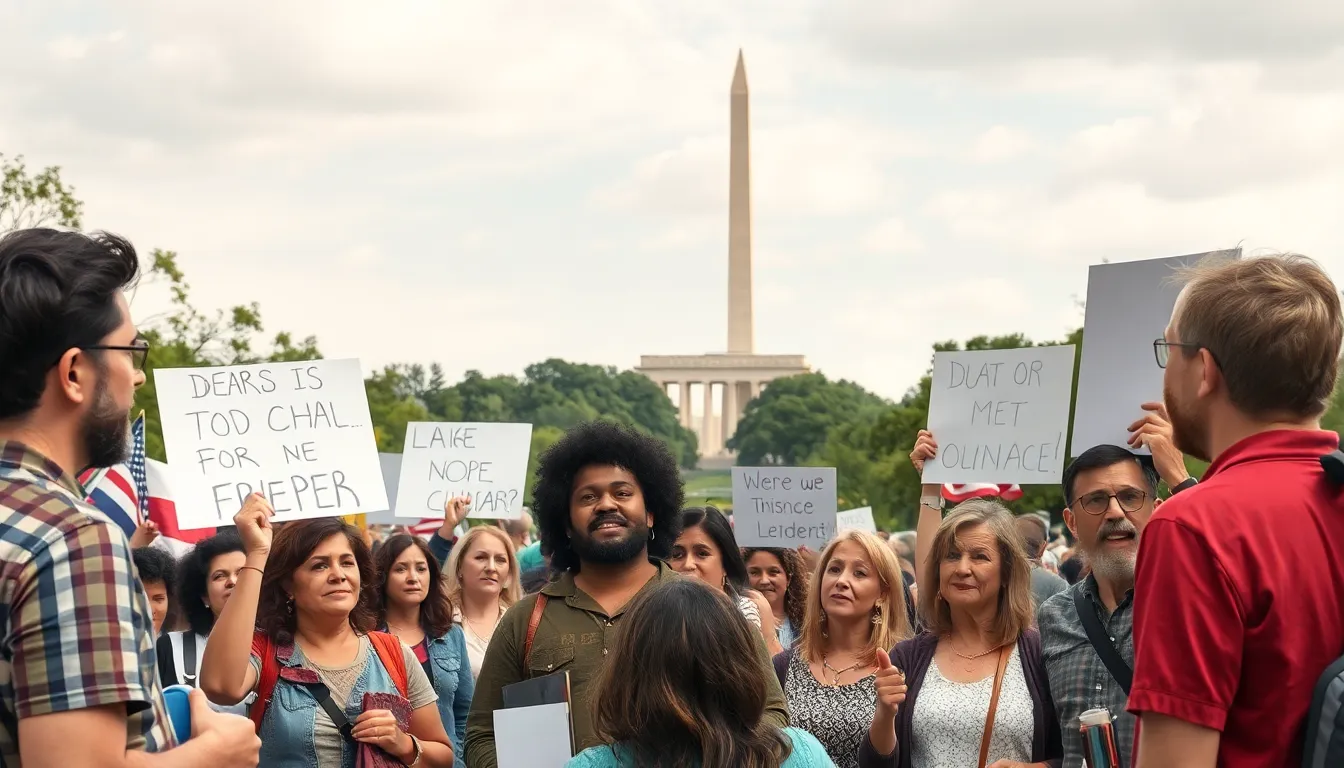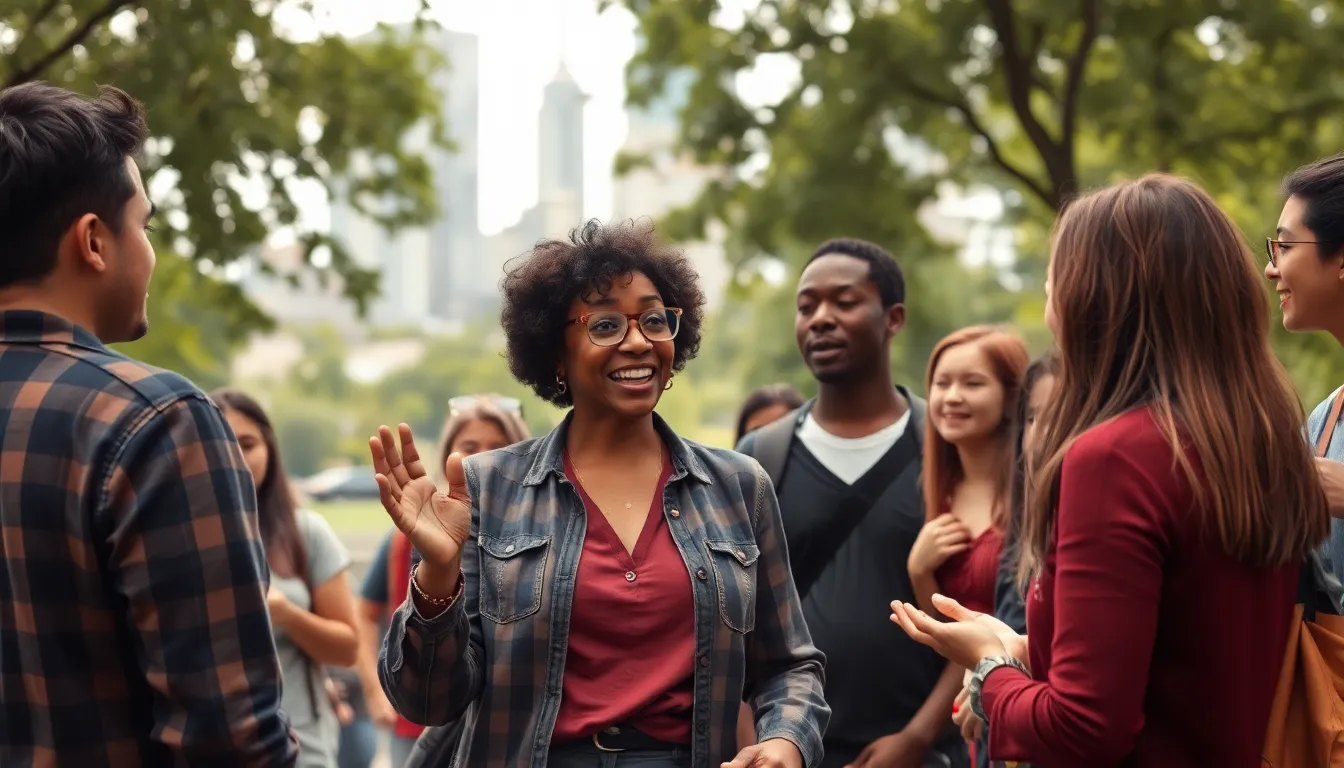Table of Contents
TogglePolitics can feel like a circus sometimes, complete with clowns, acrobats, and the occasional lion tamer. Yet beneath the spectacle lies a rich tapestry of ideas, beliefs, and reflections that shape society. Political reflections offer a chance to step back and ponder the absurdities and triumphs of governance, reminding us that while politicians may bicker like siblings, it’s the citizens who hold the real power.
In a world where headlines often read like punchlines, taking a moment to reflect can spark meaningful conversations. Whether it’s the latest policy proposal or a viral tweet, these reflections provide insight into the human condition and the ever-evolving landscape of politics. So grab your popcorn and join the discussion; the political stage is set, and it’s time to explore the drama and comedy of our shared governance.
Overview of Political Reflections
Political reflections serve as a critical lens through which to examine the complexities of governance. Such reflections encourage citizens to analyze and articulate their thoughts on political events. They foster deeper engagement with both the successes and failures inherent in leadership roles. Understanding political dynamics becomes easier when individuals take the time to reflect critically.
The act of reflecting on politics helps demystify the often chaotic nature of governance. Insightful discussions can emerge from personal and collective reflections, allowing communities to address misconceptions. Consider how these dialogues promote awareness and understanding of political systems, as well as societal norms. Gathered insights shape public opinion and political action, influencing future governance.
Effective political reflections inspire citizens to question and participate in the democratic process. They provide opportunities for individuals to voice their concerns regarding policies and leadership choices. Engaging in reflective practices cultivates informed citizenry, equipped to navigate the complexities of modern political landscapes.
Recognizing the multifaceted nature of political reflections can enhance public discourse. Inclusive conversations that encompass various perspectives contribute to a richer understanding of political realities. This dynamic interplay among diverse voices emphasizes the ongoing drama of governance, blending humor with meaningful critiques.
Ultimately, political reflections highlight the importance of ongoing contemplation in shaping a more engaged and informed society.
Historical Context of Political Reflections

Political reflections arise from a rich historical backdrop. Important events shape civic discourse, influencing how citizens perceive governance.
Key Events and Their Impacts
Significant occurrences, such as the American Revolution in 1776, altered political landscapes. The French Revolution in 1789 further ignited discussions on individual rights and governance. Civil Rights Movement leaders prompted shifts in societal perspectives during the 1960s, illustrating the power of grassroots activism. Each event fostered dialogue about justice, equality, and power dynamics. Such moments highlight how historical context contributes to subjective interpretations of political phenomena. Citizens reflect on these events to formulate opinions, driving engagement in modern governance.
Influential Political Theorists
Ideologies emerge from the works of influential political theorists. John Locke’s philosophies on natural rights shaped modern democracies, emphasizing liberty and government accountability. Karl Marx criticized capitalist frameworks, advocating for class struggle and economic equality. Hannah Arendt examined the nature of power and authority, profoundly impacting contemporary political thought. Each theorist offers a lens through which reflections on governance and civic responsibility become clearer. Their insights invite citizens to engage critically with political structures and ideologies. By studying these thinkers, individuals foster a deeper understanding of the principles guiding contemporary political landscapes.
Contemporary Perspectives on Political Reflections
Contemporary political reflections examine the evolving landscape shaped by modern movements and digital communication. Thoughtful discourse encourages a nuanced understanding of these critical elements.
Modern Political Movements
Modern political movements demonstrate a collective response to social injustices and inequalities. Leaders and activists mobilize grassroots campaigns to challenge established norms, focusing on issues such as climate change, racial equity, and gender rights. Movements like Black Lives Matter and the Women’s March embody civic engagement, driving conversations about systemic change. These initiatives encourage individuals to reflect on their roles in promoting justice and accountability in governance. Engaging with these movements fosters a sense of community, prompting citizens to actively participate in shaping their political environments.
Role of Social Media
Social media plays an essential role in contemporary political reflections, acting as a dynamic platform for dialogue and dissemination of information. Users share insights, opinions, and experiences, creating a virtual space for engagement. Platforms like Twitter and Facebook facilitate real-time discussions, enabling users to respond quickly to political events. This immediacy impacts public perceptions, shaping narratives around key issues. Communities leverage social media to organize protests and mobilize support, illustrating the power of digital networks in influencing political discourse. By fostering interactive exchanges, social media deepens understanding and awareness of complex political realities.
Personal Insights and Experiences
Political reflections offer individuals a chance to share their experiences and insights. By expressing personal observations, one can connect with broader societal issues. Engaging with political events often leads to meaningful dialogues among friends and family. Reflective conversations deepen understanding and promote critical thinking regarding systemic injustices.
Many citizens draw from historical milestones to discuss their perspectives. Events like the American Revolution can be influential in shaping civic beliefs. The lessons learned from the Civil Rights Movement resonate today, as participants analyze ongoing struggles for justice. By examining these historical contexts, people gain clarity about current political dynamics.
Movements such as Black Lives Matter inspire reflection on personal roles in advocacy. Activism encourages citizens to think critically about their responsibilities within a democratic society. Social media often amplifies these reflections, allowing individuals to exchange ideas instantly. With platforms available for discussion, brevity and clarity in communication become essential.
Political theorists like John Locke provide frameworks that enhance personal reflections on governance. His concepts can spark debates about rights and liberties, encouraging individuals to explore their beliefs. Those who engage with such ideas develop a more nuanced understanding of power structures.
Collective reflections foster a sense of community. Sharing experiences enables citizens to support one another in navigating complex political landscapes. Dialogues initiate change, influencing public opinions and actions. Through continuous engagement, an informed citizenry contributes to a more equitable democratic process.
Political reflections play a vital role in shaping civic engagement and understanding. They empower citizens to dissect political events and contribute to meaningful dialogues that address societal issues. By examining historical contexts and contemporary movements, individuals can connect their personal experiences to broader political narratives.
This process not only enhances public discourse but also fosters a sense of community among those striving for justice and accountability. As citizens continue to engage with political theories and reflect on their roles, they cultivate an informed electorate capable of navigating the complexities of governance. Ultimately, these reflections inspire active participation in the democratic process, paving the way for a more equitable society.



